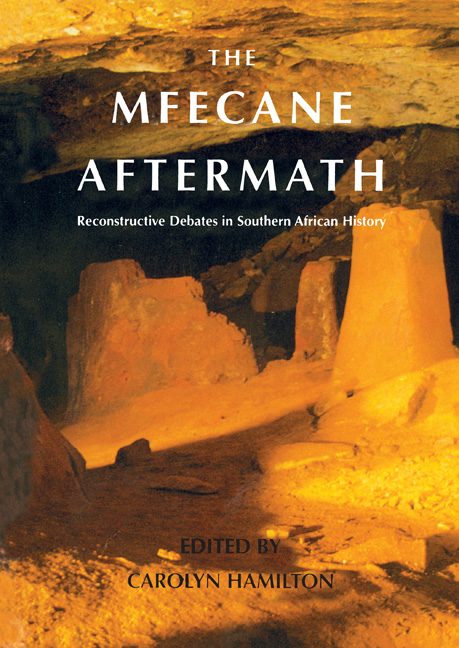Book contents
- Frontmatter
- Contents
- Maps
- Preface
- Acknowledgements
- Notes on Orthography and Names
- Contributors
- Introduction
- Part One Historiography and Methodology
- Part Two The South-Eastern Coastal Region
- Part Three The Interior
- ‘The Time of Troubles’: Difaqane in the Interior
- 11 Archaeological Indicators for Stress in the Western: Transvaal Region between the Seventeenth and Nineteenth Centuries
- 12 Prelude to Difaqane in the Interior of Southern Africa C.1600-C.1822
- 13 Conflict in the Western Highveld/Southern Kalahari c.1750-1820
- 14 ‘Hungry Wolves’: The Impact of Violence on Rolong Life, 1823-1836
- 15 The Battle of Dithakong and ‘Mfecane’ Theory
- 16 Untapped Sources: Slave Exports from Southern and Central Namibia up to c. 1850
- Glossary
- Abbreviations
- Bibliographer's Note
- Bibliography
- Complete List of Papers Presented at the Colloquium
- Index
11 - Archaeological Indicators for Stress in the Western: Transvaal Region between the Seventeenth and Nineteenth Centuries
from Part Three - The Interior
Published online by Cambridge University Press: 31 May 2019
- Frontmatter
- Contents
- Maps
- Preface
- Acknowledgements
- Notes on Orthography and Names
- Contributors
- Introduction
- Part One Historiography and Methodology
- Part Two The South-Eastern Coastal Region
- Part Three The Interior
- ‘The Time of Troubles’: Difaqane in the Interior
- 11 Archaeological Indicators for Stress in the Western: Transvaal Region between the Seventeenth and Nineteenth Centuries
- 12 Prelude to Difaqane in the Interior of Southern Africa C.1600-C.1822
- 13 Conflict in the Western Highveld/Southern Kalahari c.1750-1820
- 14 ‘Hungry Wolves’: The Impact of Violence on Rolong Life, 1823-1836
- 15 The Battle of Dithakong and ‘Mfecane’ Theory
- 16 Untapped Sources: Slave Exports from Southern and Central Namibia up to c. 1850
- Glossary
- Abbreviations
- Bibliographer's Note
- Bibliography
- Complete List of Papers Presented at the Colloquium
- Index
Summary
Lepalong is a Tswana name, recounted in oral records collected by Paul-Lambert Breutz, for a large natural cavern system in the vicinity of modern Carletonville and Potchefstroom. Lepalong was an extreme choice for a home, made, so the oral records say, by displaced Kwena people who had fled southwards away from Mzilikazi. This cavern was occupied between 1827 and 1836, and the record of that occupation is preserved in the substantial remains of what must have been a complete underground village. The value of this archaeological site is that it provides a record of social history and evidence for one kind of extreme strategic response to the strife of that period which, in the shifting matrix of what might be called the ‘difaqane’ historiography, provides a concrete expression of what life was like.
Julian Cobbing's critique of settler ‘alibi’ historiography and liberal interpretations of the difaqane locates causality for this strife and turmoil away from purely internal African agency and exposes the potential role of imperial Europe and its slaving agents. Central to his critique is a demythologising of the role of the Zulu kingdom as the prime catalyst and epicentre from which all disruption and turmoil ultimately emanated. It may be that Cobbing's analysis has swung the historiographic pendulum rather violently, and detailed regional investigations may find his general hypotheses out of step with the evidence. It is the aim of this essay to introduce archaeological material into the debate about the difaqane as an additional source from which a more detailed history for the period may be constructed. Cobbing's analyses extend the range of possibilities for assessing the archaeological evidence as it currently exists and as more comes to hand.
It seems that the present archaeological data contribute to a history of the period of upheaval labelled the difaqane in several ways. Firstly, and in the case of the western trans-Vaal, it helps untangle multiple causes by pointing out potential relationships between changes within Sotho/Tswana settlements during the late eighteenth century and an expanding northern Cape frontier as well as other tensions.
- Type
- Chapter
- Information
- Mfecane AftermathReconstructive Debates in Southern African History, pp. 307 - 322Publisher: Wits University PressPrint publication year: 1995



